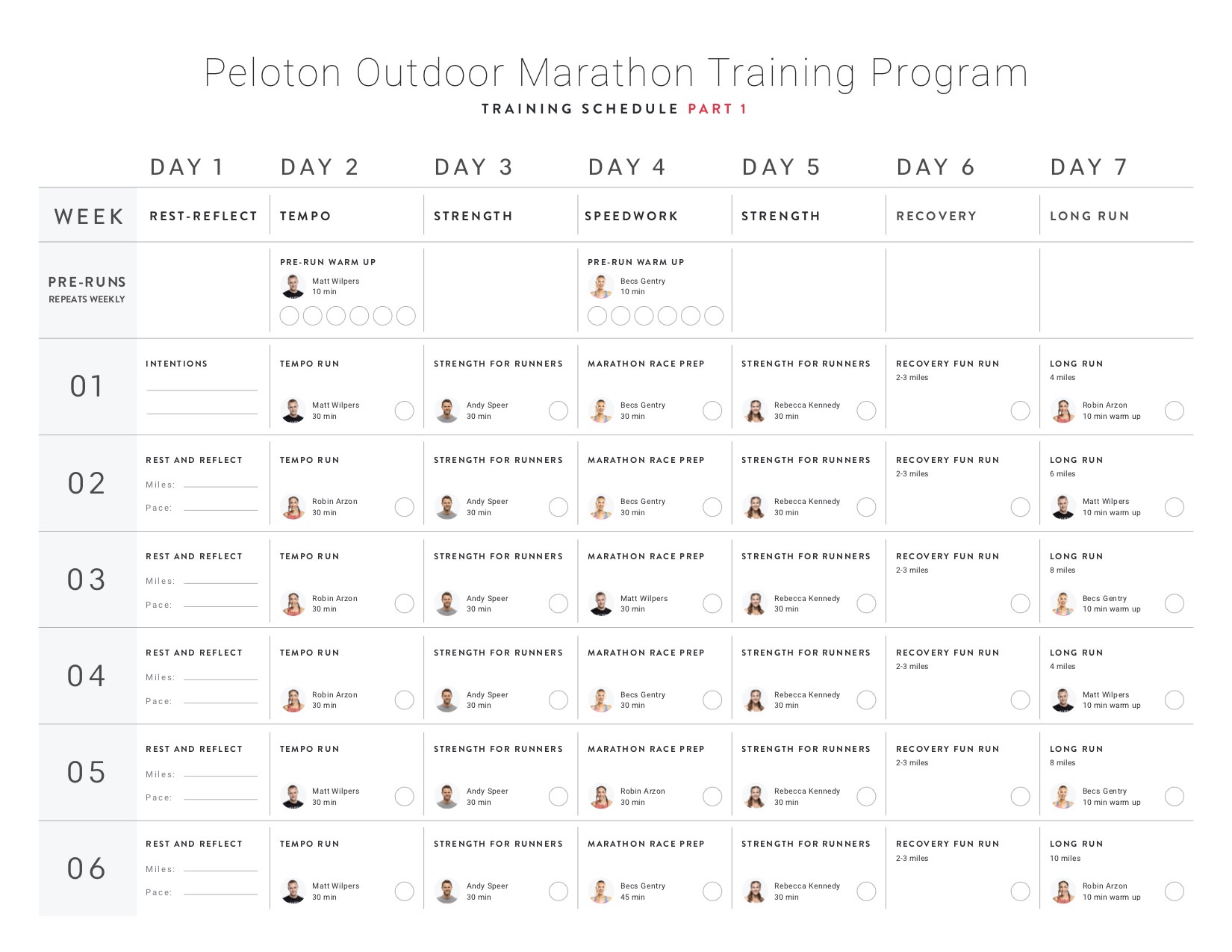
The Peloton Marathon Training Program: Tips, Tricks and FAQs
The only plan you need to get you from day one to race day.
By Team Peloton•
What Is the Peloton Marathon Training Program?
How to Do Peloton's Marathon Training Program
What Types of Classes Are In the Marathon Training Program?
Are There Classes for Long Runs In the Program?
The Marathon Training Program Overview
Our Road to Your 26.2 marathon training Program is the place to start, whether you're signed up for your first marathon or your 50th. And, it's all available on the Peloton App—no hardware required. We tapped the instructor team behind it—Robin, Becs, Matt, Rebecca, and Andy—to give you some insights into the Program, help you prepare for your training journey and answer your burning questions.
Discover more ways to reach your goals with Peloton

Peloton App
Access thousands of classes with no equipment needed.
What Is the Peloton Marathon Training Program?
This community has shown us that committing to a goal is better together. This Program will give you the workouts, the epic playlists, and the tips and wisdom that you get with every Peloton class, all packaged up into a three-part, 18-week Program that will keep you focused, inspired and strong from your first training run through the finish line.
No matter where you’re starting from, we know the marathon is an epic feat of physical and mental agility. We designed this Program with first-timers and intermediate marathoners in mind. The Program is meant to be easily adapted to your plans, whether you just want to finish, or you have a specific time goal in mind. We recommend getting comfortable running continuously for 3 to 4 miles before you dive into the Program.
How to Do Peloton's Marathon Training Program
The Program is currently available on the Peloton App. Find Part 1 of the Road to 26.2 Program in the Programs tab on your App, then select 'Start Program' to get going. Combining guided, audio-only outdoor running classes with strength classes, this is a Program you can take anywhere, anytime. Plus, with the Just Work Out feature on iOS, your mileage will all be recorded on the App for ease of tracking your progress throughout.
We recommend starting the Program at least 18 weeks out from your planned marathon. If you’re newer to distance running, we recommend giving yourself an extra month to start running before you dive into the Program.
The Program is planned on a seven-day schedule, giving you the flexibility to decide which day of the week you start the Program. While the full plan (see below) suggests Sunday for your long run and Monday for your rest day, you can adapt the plan to suit your schedule. Is your race on a Saturday? You might want to consider doing your long runs on Saturdays too. Just be sure to alternate rest and recovery days with your harder efforts and long runs.
What Types of Classes Are In the Marathon Training Program?
Our instructors incorporate five main class types into this Program: tempo runs, race prep runs, strength classes, recovery fun runs and long run warm-ups. Each of these will allow you to gain speed and strength, get in the race day mindset, and allow plenty of time for rest and recovery. Following these class types from week to week will also allow you to easily track your progress across the 18 weeks of the Program. Some weeks, you’ll closely follow the same class plan as the previous week, which gives you an opportunity to test your performance and see if you can improve over last week’s metrics!
Are There Classes for Long Runs In the Program?
We’ve created a 10 min warmup run for each of your weekly long runs to get you in the zone with long run-specific tips and motivation from Robin, Becs, and Matt. This accommodates the breadth of paces you’ll be running during your long run, and also lets you use the long run as training ground for your race. When doing your long runs, try using the Just Work Out feature to keep track of your mileage.
The Marathon Training Program Overview

Your 18-Week Plan - Download
We created this simple PDF that you can download above that includes the full schedule that you can view, save, and print to help you plan your training.
Related Articles

Marathon + Racing
How to Train for a Marathon at Every Level

Marathon + Racing
Here's How Long You Need to Train for a Marathon (Depending On Your Experience Level)

Marathon + Racing
Running a Marathon? Here’s Everything You Need to Know About Recovery

Nutrition
The Ultimate Guide to Marathon Training and Race Day Nutrition
This content is for informational and educational purposes only and does not constitute individualized advice. It is not intended to replace professional medical evaluation, diagnosis, or treatment. Seek the advice of your physician for questions you may have regarding your health or a medical condition. If you are having a medical emergency, call your physician or 911 immediately.
Level up your inbox.
Subscribe for a weekly dose of fitness, plus the latest promos, launches, and events.
By providing your email address, you agree to receive marketing communications from Peloton.
For more about how we use your information, see our Privacy Policy.





